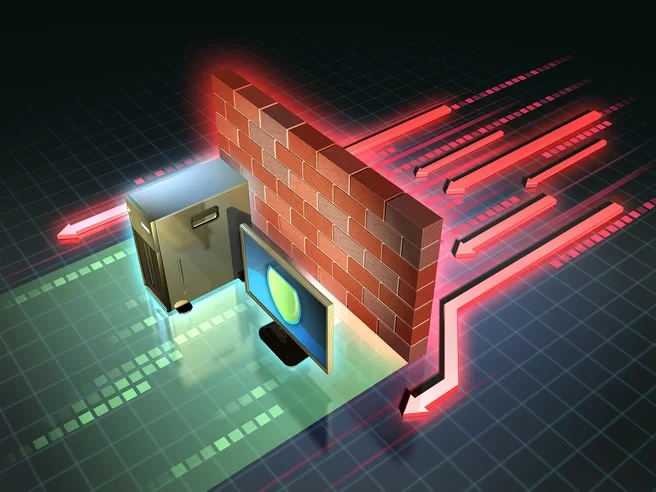The Role of Firewalls in Network Security




A firewall is a network security system that monitors and controls incoming and outgoing network traffic. It operates based on a set of predefined security rules that determine whether to allow or block specific traffic. By creating a barrier between internal systems and potential external threats, firewalls play a pivotal role in preventing unauthorized access to an organization’s network.
Hardware Firewalls: These are physical devices between your network and the internet, filtering traffic before it reaches internal devices.
Software Firewalls: These are applications installed on individual devices to monitor traffic entering or leaving that specific device.
How Do Firewalls Protect Networks?
Firewalls function as gatekeepers, controlling access to your network based on rules that filter out potentially harmful data. Here are the primary ways firewalls contribute to network security:
1. Monitoring and Filtering Network Traffic
Firewalls analyze the data packets that travel in and out of the network. They can inspect these packets for malicious content and either block or allow them based on preset rules. This helps keep out suspicious or unauthorized traffic, such as malware or hackers attempting to access sensitive data.
2. Preventing Unauthorized Access
By enforcing strict access policies, firewalls ensure that only authorized users and devices can connect to the network. For businesses, this means that sensitive systems are protected from external threats while allowing legitimate users to access the necessary resources.
3. Blocking Malicious Attacks
Modern firewalls are equipped with advanced detection mechanisms to identify known threats, such as viruses, worms, and Trojan horses. Firewalls can also help prevent Distributed Denial of Service (DDoS) attacks, where malicious actors flood a network with traffic to overwhelm its resources and bring it down.
4. Creating Segmented Networks
Firewalls can create distinct network segments, isolating specific parts of your infrastructure. For instance, a company’s internal servers could be placed on a separate network from employee devices, reducing the risk of internal breaches or accidental data exposure.
5. Logging and Reporting Activity
A key benefit of firewalls is their ability to log traffic and network activity. This allows IT teams to review any suspicious behavior and fine-tune security protocols to better protect the network. In the event of a breach, these logs can also be crucial for forensic analysis and identifying the cause of the attack.
Firewalls have evolved over time to meet the needs of modern networks. Below are the key types of firewalls:
Packet-Filtering Firewalls: These firewalls examine packets of data and allow or block them based on set criteria like source and destination IP addresses. They are fast but have limited protection against advanced threats.
Stateful Inspection Firewalls: These go beyond packet filtering, tracking the state of active connections and making decisions based on both incoming and outgoing traffic. This provides stronger protection than basic packet-filtering firewalls.
Proxy Firewalls: These act as intermediaries between internal networks and external systems, inspecting traffic at the application layer and providing robust security for complex threats.
Next-Generation Firewalls (NGFW): These advanced firewalls integrate multiple security features like intrusion prevention, deep packet inspection, and application awareness. NGFWs are ideal for businesses that require comprehensive, real-time protection from sophisticated attacks.
Why Firewalls Are Crucial for Businesses
In an era where cyber threats are constantly evolving, firewalls are indispensable for protecting a business’s network. Here’s why businesses can’t afford to overlook firewalls:
Data Protection: Firewalls safeguard sensitive data from external threats, ensuring compliance with data protection regulations.
Business Continuity: A breach can disrupt business operations, leading to financial loss and reputational damage. Firewalls help prevent such incidents, ensuring business continuity.
Employee Productivity: By blocking access to malicious or inappropriate content, firewalls ensure employees can focus on work without the risk of stumbling upon harmful websites.
Building a Secure Network with Vserv Academy
At Vserv Academy, we offer courses and resources that cover the full spectrum of network security, including how to implement, configure, and manage firewalls. Whether you’re an IT professional looking to enhance your skills or a business leader seeking to protect your organization, our courses provide the expertise needed to safeguard your network from today’s most pressing cyber threats.
In conclusion, firewalls are the first line of defense in securing any network. They not only filter traffic but also help prevent unauthorized access, ensuring that your business operates safely and efficiently in the digital age. Investing in the right firewall and understanding how to manage it is critical to keeping your network secure.
Stay ahead of cyber threats with Vserv Academy—where we train the next generation of IT professionals to build and maintain secure, resilient networks.
Leave Your Comment Here